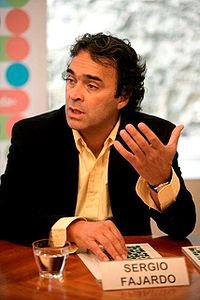 Over the past few days, I’ve been listening to a talk given in February at Cornell by Sergio Fajardo, who was mayor of Medellin, Columbia Colombia, from 2004 to 2007 and is now campaigning for president of Colombia in next year’s election. This guy is amazing, and I highly recommend his presentation, which you can listen to by clicking here for the audio and here for the page at UChannel podcasts, an excellent Princeton series of lectures from all over the world. To download a QuickTime video of his talk, click here and then click on the video-tube icon that has the letters “UC” on it.
Over the past few days, I’ve been listening to a talk given in February at Cornell by Sergio Fajardo, who was mayor of Medellin, Columbia Colombia, from 2004 to 2007 and is now campaigning for president of Colombia in next year’s election. This guy is amazing, and I highly recommend his presentation, which you can listen to by clicking here for the audio and here for the page at UChannel podcasts, an excellent Princeton series of lectures from all over the world. To download a QuickTime video of his talk, click here and then click on the video-tube icon that has the letters “UC” on it.
When I hear the name “Medellin” I think of drug lords and death. I had no idea that a reform coalition headed by a charismatic mathematician, Sergio Fajardo, won the mayor’s race in Medellin in 2004 with the intention of solving the city’s two huge and interrelated problems of violence and inequality.
I was pleased to hear Fajardo in his orienting of the Cornell audience explain that Medellin is “a mile high, a little less than Denver, 50 meters below Denver.” This made me think he might be a natural participant in Denver’s exciting Biennial of the Americas scheduled for next year. His mixture of creativity and pragmatism reminds me of Denver Mayor John Hickenlooper, and if they have not already met I feel confident they would find themselves very at home in each other’s company.
“Since I am a mathematician, I like to address issues the way a mathematician would do,” Fajardo told his audience at Cornell, “to say, ‘What problems are we going to solve here?” The first problem his team chose to address was inequality. “Latin America is the most unequal region in the world, and within that most unequal region in the world, Colombia is one of the most unequal countries, and Medellin is part of Colombia, so we have a very unequal society,” he said.
The second problem this mathematician attacked is violence, which came into Medellin in full force at the beginning of the 1980s with the rise of narco-traffic. “That was a bomb that was thrown at our society, and that bomb has shaken the foundations of our city and the foundations of Colombia,” Fajardo stated, in his calm and resonant cadence. To watch him on the video and hear his voice, you’d think this is a poet or a scientist at quiet work far from the hurly burly of urban and national politics. His centered presence and equanimity remind me of another unlikely leader who has similarly promised to change not only policies, but the way politics are conducted in the U.S.
The story Fajardo told in the hour-long talk unfolded like a novel, or the account of a team of scientists hunting the cure for a killer virus. They decided they could not address violence and inequality at the same time, because the roots of those two trees were too strong. So they tackled violence first, beefing up the police force, and then they built library parks in the poorest neighborhoods of the city. Fajardo did not sugarcoat the pain involved and the mistakes made. But at each crisis or challenge, he simply looked at the next action that would make an improvement, and he never stopped.
As I listened to the podcast while working out on the cross-trainer, I tried to imagine how passionate conservatives like my parents would hear the story. I liked to think it would not be easy to dismiss this man as simply one more Latin American Leftist bent on diminishing personal freedoms under the guise of equality. He never mentioned taxes in his talk, and when someone asked how he had paid for all the good projects in the poor neighborhoods, he said that yes, they had raised land taxes. This apparently was accepted by the wealthy who I’m sure paid the lion’s share of the increases, perhaps because of these two promises the new mayor’s team made:
Every single peso that you give us, we will translate into something like this: “Here are your taxes .” We had that statement in all the places we went to. So we managed to tell people that they were giving us the money and what they gave us we translated into something very good for everyone. … And then, something very simple — we didn’t steal a single peso.
By the time of Denver’s Biennial of the Americas, this mathematician turned mayor might be the President of Colombia. This would be a great time for us to issue him an invitation to be a keynote speaker!
 Send to Kindle
Send to Kindle